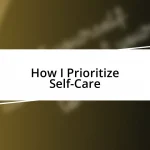Key takeaways:
- Acknowledging the need for professional help is a courageous step towards healing and understanding.
- Preparation for therapy, including reflecting on goals and being open, enhances the effectiveness of sessions.
- Effective communication with your therapist fosters a supportive relationship and aids in personal growth.
- Tracking progress through journaling and setting small goals can reveal significant personal development over time.
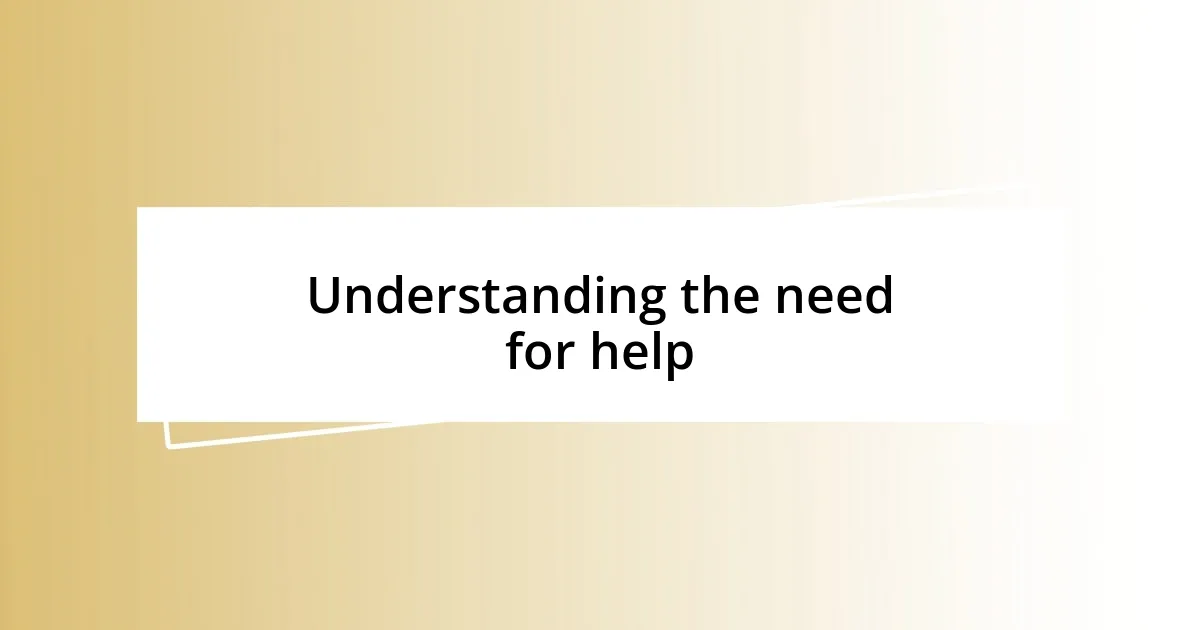
Understanding the need for help
It’s easy to dismiss feelings of sadness or overwhelm as just “a phase” we’ll get over. I remember a time when I shrugged off my anxiety, thinking it was just stress from work. But deep down, I sensed that something wasn’t quite right—could that feeling have been my mind’s way of signaling that I needed more than just a break?
The reality is, we all encounter moments when our usual coping mechanisms feel inadequate. I once tried to tackle a particularly tough time in my life by burying myself in self-help books. While they offered some insights, it was only through professional guidance that I found the clarity I was desperately seeking.
Acknowledging the need for help can be daunting. I still recall the day I made the call to a therapist; my heart raced, and doubts flooded my mind. But I wonder, isn’t it brave to accept that you don’t have to navigate life’s complexities alone? Seeking help isn’t a sign of weakness—it’s a courageous step toward understanding and growth.
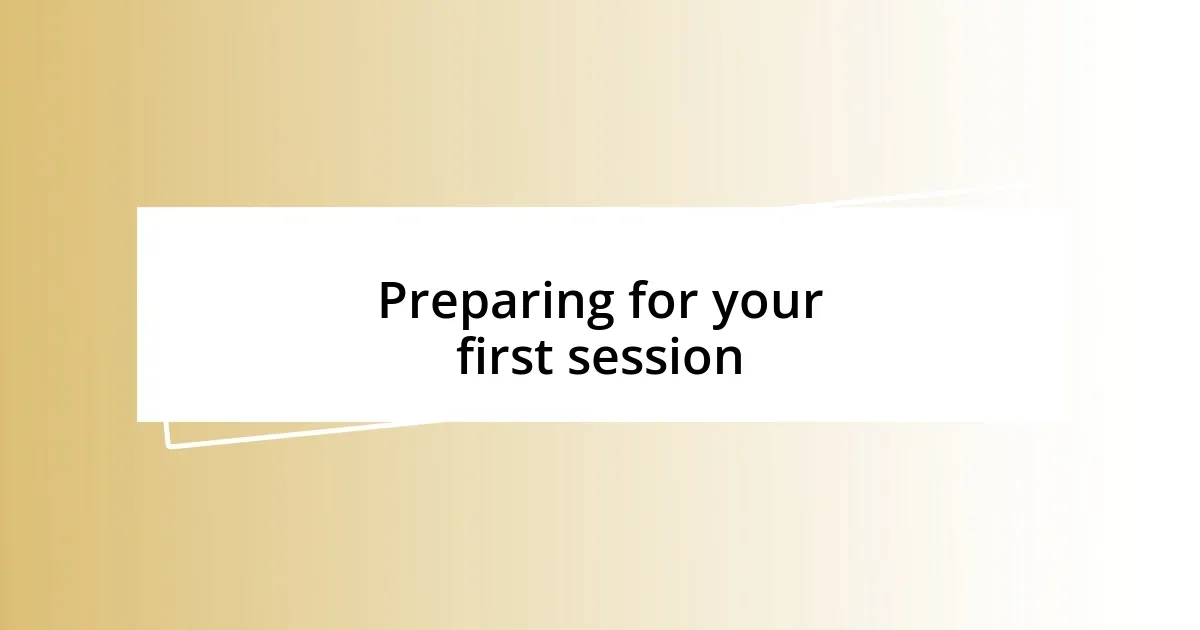
Preparing for your first session
Preparing for your first session can stir up a mix of excitement and anxiety. When I walked into my first therapy appointment, I remember feeling a bit out of place, like I was stepping into a new world. It helped to remind myself that this space was meant for my growth and healing. To ease those nerves, I created a little plan ahead of time.
Here are some steps I took to prepare for my first session:
-
Reflect on your goals: Think about what you want to achieve with therapy. I found it helpful to jot down my goals so I could express them clearly.
-
List concerns or topics: Take note of any specific issues or feelings you want to address. I compiled a short list; it made the initial conversation flow more naturally.
-
Gather relevant information: If applicable, gather any past medical records or treatment details. Although I didn’t have much, knowing what I had helped me feel more prepared.
-
Arrive early: Give yourself time to settle in. I underestimated the value of a few extra minutes to breathe and acclimate to the environment.
-
Be open and honest: I reminded myself that vulnerability leads to healing. Being forward with my feelings from the start helped build trust with my therapist.
Every person’s experience is unique, but being prepared can help you make the most of your first session. Allowing yourself to be authentic, and embracing the journey is part of what makes seeking help so transformative.
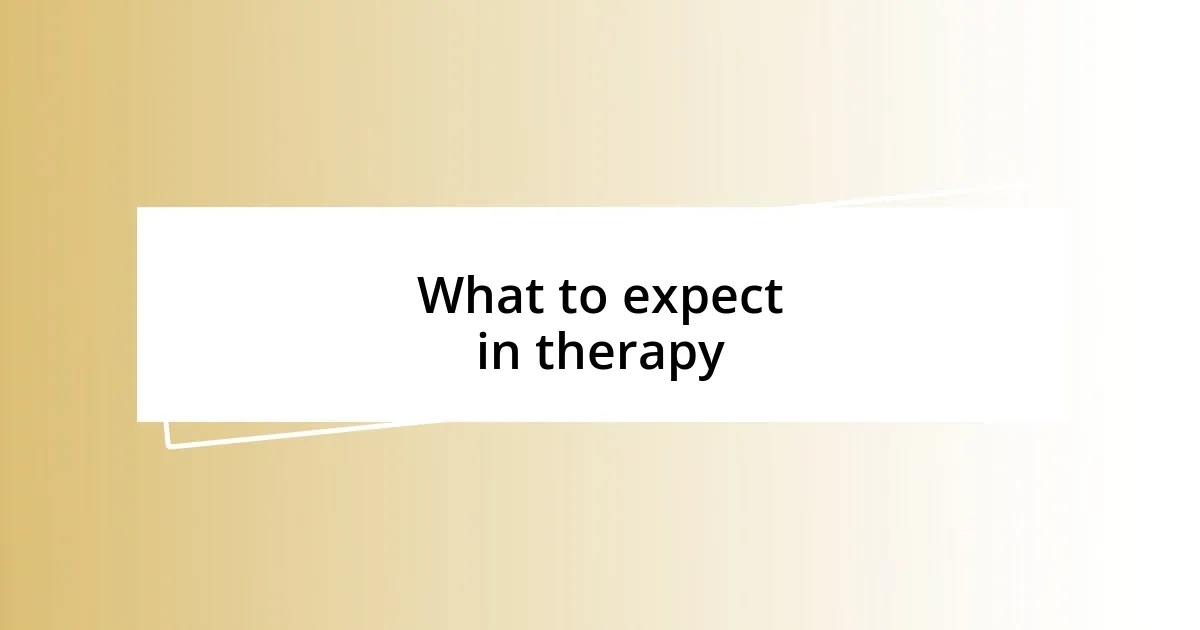
What to expect in therapy
When you start therapy, it’s essential to understand that it’s a process tailored to your needs. In my first few sessions, I was surprised by how many emotions sprang forth, often from issues I had buried for years. I remember feeling vulnerable yet strangely relieved when I voiced my thoughts aloud. It was a revelation—talking became a release, much like lifting a heavy weight off my shoulders.
Expect to experience a variety of emotions during therapy sessions. Sometimes, breakthroughs happen. Other times, I walked out feeling confused or even frustrated, questioning if I was truly making progress. However, I learned that this ebb and flow is part of the healing journey, and not every session will yield immediate results. In fact, that uncertainty can often lead to deeper insights about oneself, which I found incredibly enlightening.
Throughout the process, communication is key. My therapist often encouraged me to share openly about what I was feeling, reinforcing that no thought was too trivial. Being able to express my worries without judgment was liberating. This collaborative relationship really helped me feel supported while exploring my inner self.
| What to Expect | Insights from My Experience |
|---|---|
| Emotional Variability | Emotions can fluctuate; some days feel like a breakthrough, others may leave you confused. |
| Vulnerability | Sharing feelings can be daunting, yet it can also be remarkably freeing. |
| Communication | Open dialogue with your therapist is crucial for effective progress. |
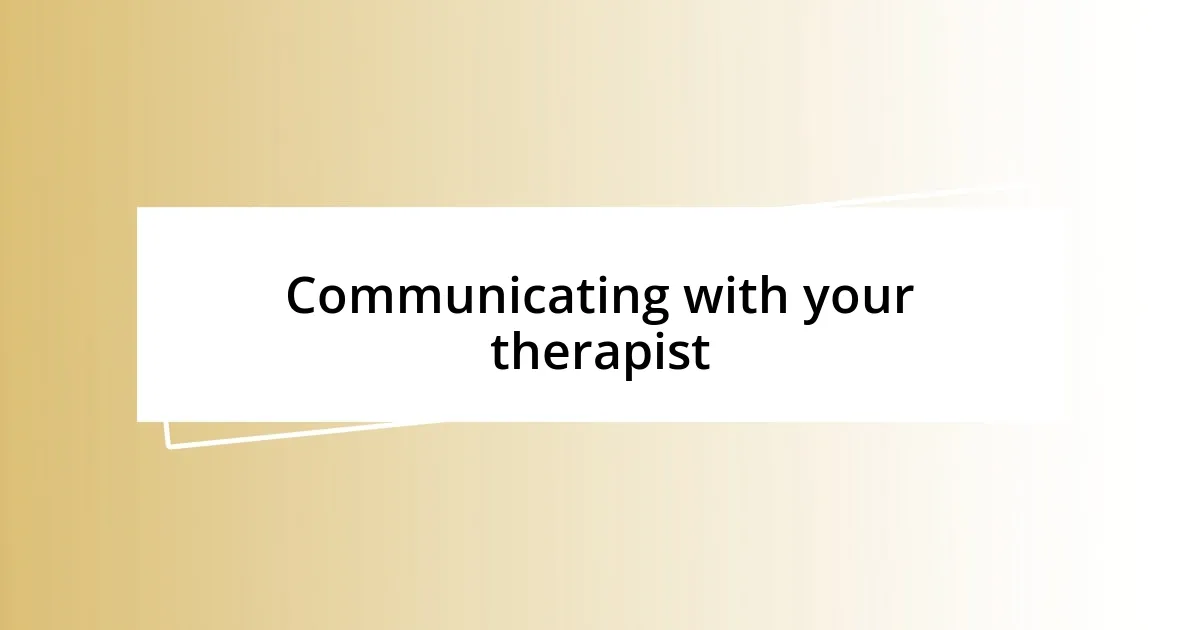
Communicating with your therapist
Communicating with your therapist is one of the most vital components of the therapeutic process. I remember a session where I hesitated to share something that had been bothering me for weeks. The moment I finally spoke up, I was surprised at how much lighter I felt; it became clear that holding back was weighing me down. Have you ever felt that rush of relief after finally voicing what’s been stuck in your mind?
It’s essential to express not just your feelings but also your expectations. Early on, I realized I needed to voice my anxiety about the therapy process itself. My therapist welcomed my honesty and reassured me that these feelings were normal. This created a safe space where I could articulate my fears, making the experience more about collaboration than a one-sided conversation.
Sometimes, feedback can be equally as valuable as sharing. After discussing certain topics, I would ask my therapist how she thought I was doing. I found that her insights offered a fresh perspective on my journey, like a trusted friend providing guidance. I encourage you to not only speak freely but also seek feedback; it can lead to profound self-discovery and growth. Isn’t amazing how much clarity can come from a simple conversation?
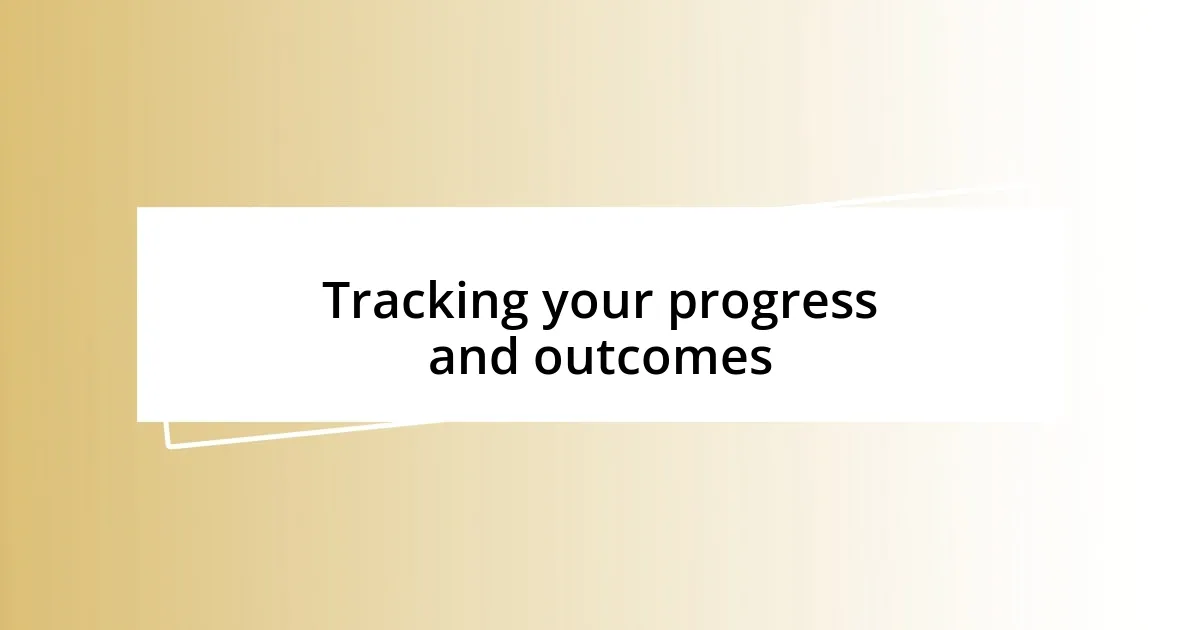
Tracking your progress and outcomes
Tracking your progress in therapy can be both enlightening and daunting. I kept a journal to note my feelings after sessions, like snapshots of my emotional landscape. At first, it felt awkward—how could scribbling on paper really show progress? But looking back, those entries revealed significant growth that I might have otherwise overlooked.
I also found it helpful to set small, achievable goals. For instance, I aimed to articulate one feeling more clearly each week. I remember discussing this goal with my therapist, and she was thrilled. The excitement in her voice made me realize that tracking these mini victories not only validated my efforts but also motivated me to do more. Have you counted your wins, however small they may seem?
Another method that worked wonders for me was reflecting on changes in my thought patterns. There were moments when I’d look at old journal entries or notes and marvel at how my perspective on certain issues had shifted. It felt like a gentle reminder of how far I’d come. Have you ever looked back and realized you’ve changed in ways you never expected? Those realizations can be profound, serving as beacons of hope during challenging times.

Building a supportive environment
Creating a supportive environment is essential in therapy. One of the pivotal moments in my journey happened when I realized how much my surroundings influenced my comfort level. I remember rearranging my therapy space at home—making it cozier with soft lighting and a comfortable chair. Suddenly, those sessions became less intimidating and more like a sanctuary where I felt free to express myself. Have you ever changed your environment and felt an instant lift in your mood?
Another crucial aspect is surrounding yourself with caring individuals. I chose to let my close friends and family in on my journey. Sharing my therapeutic experiences with them not only lightened my load but also fostered deeper connections. It was heartening to know that I had a support system cheering me on. Have you thought about who you can lean on during your pursuit of healing?
Additionally, incorporating self-care into your routine can significantly enhance your therapeutic experience. I began to embrace practices like mindfulness and gentle exercise, which created a ripple effect—reinforcing what I was learning in therapy. These practices provided moments of peace and reflection, further solidifying the supportive environment I was trying to cultivate. How do you prioritize self-care in your own life? It’s amazing how nurturing yourself can set the stage for emotional growth.









